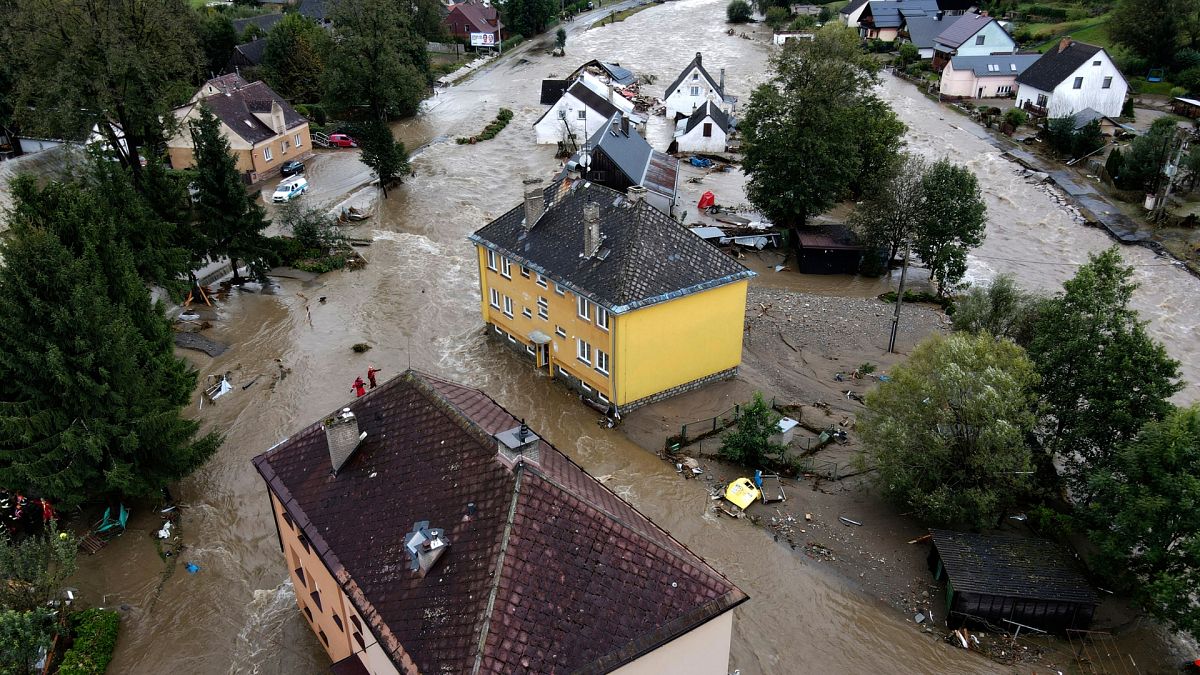Researchers also warn that the cost of climate disasters in Europe is rapidly rising.
Flooding that killed 24 people in Central Europe earlier this month was caused by rainfall made twice as likely by human-induced climate change, a group of scientists said on Wednesday.
Storm Boris stalled over Central Europe from 12 to 16 September, inundating Poland, Romania, Slovakia, Austria, Czechia, Italy and Germany with torrential rain. Thousands of people have had to leave their homes as buildings were swept away, bridges collapsed and infrastructure was damaged.
Now a rapid analysis by researchers from World Weather Attribution (WWA) has found the “fingerprints of climate change” on the intense rainfall that caused this deadly flooding.
“Yet again, these floods highlight the devastating results of fossil fuel-driven warming,” says Dr Joyce Kimtual, a researcher at Imperial College London’s Grantham Institute – Climate Change and the Environment.
“Until oil, gas and coal is replaced with renewable energy, storms like Boris will unleash even heavier rainfall, driving economy-crippling floods.”
Unusual conditions made worse by climate change
The researchers from WWA found that the four days of rainfall from Storm Boris was the heaviest ever recorded across Central Europe by a significant margin. The precipitation also covered an unusually large area, even greater than previous historic floods in 1997 and 2002.
Cold air from the Alps meeting very warm air from the Mediterranean and Black Seas created a “perfect storm” that then dropped heavy rainfall over a very large area, the scientists say.
They add that regardless of the unusual conditions, climate change made Storm Boris more intense and more likely.
Using weather observations and climate models, they found that climate change has made severe four-day downpours at least twice as likely and 7 per cent heavier. If global warming reaches 2C, similar similar storms will drop at least 5 per cent more rain and occur around 50 per cent more frequently.
Europe needs to prepare for extreme weather
The cost of damages caused by extreme weather in Europe is rising.
Austria’s insurance companies have estimated that damages from the recent flooding could hit €1 billion. Poland’s government has pledged 2 billion zloty (€468 million) in “free and non-repayable aid” for families and home renovations. In Romania, where poorer communities are largely uninsured, the government has allocated 100 million RON (€20 million) to affected households.
European Commission President Ursula von der Leyen promised €10 billion of assistance for flood recovery.
But WWA scientists say the massive damage and disruption highlights the need to urgently prioritise preparation for extreme weather events like this.
“These floods were big, widespread and hugely damaging. They were well forecast and the planning and action taken, by both individuals and authorities, undoubtedly helped save lives,” says Hannah Cloke, professor of hydrology at the University of Reading.
“Yet many people still tragically died. For some, they were unable to imagine the effects of such intense rainfall. It is vital, as extreme rainfall gets more extreme, that we develop new ways of helping people understand the risks.”
Tackling the sources of the emissions that are contributing to their intensity is also vital.
“Crippling droughts in southern Italy. Devastating wildfires in Portugal. Killer floods in Central Europe. Climate change is wreaking havoc in Europe, but politicians across the continent are trying to pull back on climate commitments,” adds Friederike Otto, senior lecturer at Imperial College London’s Grantham Institue – Climate Change and the Environment.
“Climate change is an existential threat, especially for poorer parts of society, and all Europeans need to know that tackling it will make their lives so much better – ending fossil fuels creates jobs, lowers energy bills, makes cities healthier places to live, and reduces the risk of killer floods.”

